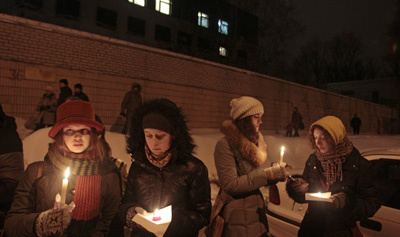New York, December 21, 2010–The Committee to Protect Journalists condemns the prison sentences handed down to journalists who reported on post-election protests in Belarus, and the anti-media rhetoric by President Aleksandr Lukashenko.
At a news conference Monday, a defiant Lukashenko pledged to make journalists “answer for every word they write,” the presidential press service reported. He told journalists his government had detained a total of 639 people for “holding an unsanctioned demonstration.” Lukashenko went on to call the protesters and those who covered them “pogromists and bandits.”
The Belarusian Association of Journalists (BAJ) continued to update its roster of journalists arrested, beaten, and sentenced to jail terms in speedy trials in Minsk. More than 20 journalists have been arrested and at least as many beaten between the outbreak of rallies Sunday evening and their forcible dispersal in the early morning on Monday, according to local news reports and CPJ sources. Today, BAJ reported that at least nine journalists have already been sentenced to jail terms between 10 and 15 days on trumped-up charges of either organizing or participating in unsanctioned demonstrations.
“We are appalled by the continued arrests and jail terms handed down to journalists. This is a Soviet-style retaliatory technique to chill critical coverage when tensions are heightened,” CPJ Europe and Central Asia Program Coordinator Nina Ognianova said. “We call on President Lukashenko to ensure that all detained reporters are released at once and allowed to continue working without fear of reprisal.”
Prominent Belarusian journalists Natalya Radina, editor of the pro-opposition news website Charter 97, and Irina Khalip, local correspondent for the Moscow-based independent newspaper Novaya Gazeta, both remained at the Minsk detention facility of the Belarusian security service, the KGB. It is unclear what they are charged with, and they have not had access to a lawyer, local sources told CPJ.
Khalip was beaten and forcibly taken by riot police while on the air with the independent Russian radio station Ekho Moskvy on Monday morning. Her husband, opposition presidential candidate Andrei Sannikov, was repeatedly struck with clubs and also arrested; he is one of at least six Lukashenko challengers who remained jailed today. Radina was arrested when special forces stormed the office of Charter 97 on Monday morning and took her and three volunteers in the newsroom that morning to the KGB headquarters. The three volunteers, who have not been identified, were moved to a detention center in Zhodino district; each has been sentenced to 10 days in jail, according to BelaPAN news agency.
Aleksandr Astafyev, a photojournalist with the St. Petersburg-based Russian newspaper Moi Rayon, who was detained Sunday evening while covering the protests in Independence Square, was sentenced to 10 days in jail on Monday, the BAJ said. He is currently on a hunger strike to protest the authorities’ actions, according to local press reports. Astafyev briefly recounted his experience for the Moscow-based Ekho Moskvy today, while awaiting a new hearing in his case at the Palace of Justice in Minsk. In the past two days, he had been shuffled along with other journalists and opposition activists from one detention facility to another, because “the Belarusian Interior Ministry has arrested more people that they can hold,” he told Ekho Moskvy.
Thousands of protesters gathered in Minsk’s Independence Square after the Election Commission announced preliminary results declaring Lukashenko the winner with almost 80 percent of the vote, which the opposition said was a tainted count. On Monday, observers with the Organization for Security and Co-operation in Europe criticized the lack of transparency in the vote tally.
